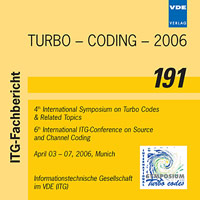Performance of Turbo Codes using MLSE-Based Early Stopping and Path Ambiguity Checking for Inputs Quantized to 4 Bits
Conference: TURBO - CODING - 2006 - 4th International Symposium on Turbo Codes & Related Topics; 6th International ITG-Conference on Source and Channel Coding
04/03/2006 - 04/07/2006 at Munich, Germany
Proceedings: TURBO - CODING - 2006
Pages: 6Language: englishTyp: PDF
Personal VDE Members are entitled to a 10% discount on this title
Authors:
Gracie, Ken; Hunt, Andrew; Crozier, Stewart (Communications Research Centre, Ottawa, Canada)
Abstract:
The large performance gains of Turbo codes are achieved with computationally intensive iterative decoding. Early stopping rules reduce this computational burden but require some overhead and can even introduce degradations in error rate performance, particularly in the so-called “flare” region. This paper investigates the performance of a fixed-point Turbo decoder using an early stopping rule based on maximum likelihood sequence estimation (MLSE) when the decoder inputs are quantized to only 4 bits. The MLSE-based early stopping rule is shown to deliver performance that is virtually equivalent to that for a fixed maximum number of iterations provided that the decoder produces valid MLSE bit sequences. Quantization effects are also investigated.


